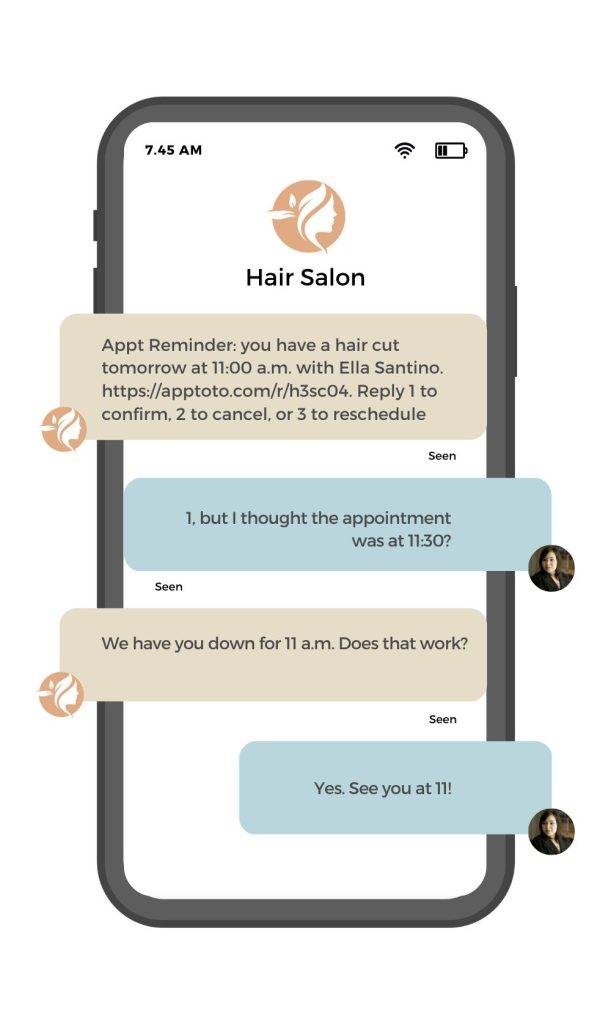Estimated reading time: 7 minutes
If you run a business that relies on appointments, then you’re all too familiar with the frustration of no-shows and late arrivals. It can create a huge strain on your business (not to mention stress levels).
There have been many studies and prescriptions for how to minimize appointment cancellations.
In some cases, the prescription is clear: financially discipline people for missing their appointment, and they will be less likely to do it.
But many times, these policies are overly punitive, charging hefty fees for customers or patients that create rifts in relationships that aren’t easily repairable. You may be recouping some of your costs, but ultimately, this method may be hurting your business.
It’s a delicate balance to strike, and many businesses struggle with how to do it well.
So, how can you tackle the problem without creating new issues?
What does an effective policy look like in practice?
Let’s take a look at some of the key aspects and how they work together.
Key aspects of an effective cancellation policy
When outlining your appointment cancellation policy, there are a few main points that must be considered and addressed:
- Timeframe for cancellation
- How cancellations need to be communicated (via call, text, email, etc.)
- Punishment or reward systems for cancellations
- How to handle repeat cancellations
- Define exceptions to any fee or punishment
- How to clearly communicate your policy
Each of these pieces forms the basis for your policy, but the same policy is not right for everyone. You’ll need to do more consideration to determine what will meet your needs without alienating your clients or patients.
Consider these questions when crafting your policy
Before you jump into writing down your formal policy, you’ll want to consider the specific circumstances of your business or practice. Problem-solving is a two-part process, first defining and understanding the problem and then crafting a solution.
In this case, you need to understand some underlying things about cancellations that are unique to your clientele.
Here are a few key questions to ask yourself when crafting your policy to try to determine what’s best for your business or practice:
1. Why do people cancel?
Truly understanding the reasons behind cancellations is a critical first step.
If your patients or customers cancel primarily because of real, unforeseeable circumstances, then something like a missed appointment fee will not help your situation—it only upsets your clientele. If you’re getting a lot of cancellations simply due to things like forgetting an appointment and double-booking, then it’s worth your time to evaluate your communication strategy with clients.
2. When do people cancel?
Start tracking when cancellations are made and see if you can spot any trends or patterns.
Are most people cancelling last minute, or do they give you advance notice? Could you mitigate some of the cost by simply receiving a cancellation notice?
3. How much notice do you need to be able to reschedule the time slot?
If you can rebook the time slot, there’s often no need to take drastic measures to reduce cancellations.
Consider the bigger picture to understand which solutions might be viable for solving the problem and which may not. If your proposed policy doesn’t help you get the notice you need to reschedule, you may want to adjust it.
But there’s still more.
Beyond just what works for you, you should consider some best practices and how they are implemented in different situations and for different industries.
Communication is key

The most important part of your appointment cancellation policy is communication.
Not only should you focus on clearly communicating the terms of your policy, you should also focus on clear communication as a way to mitigate no-shows and late arrivals.
In many cases, appointments are missed either because the client/patient didn’t take note of their next appointment and forgot, or new clients felt they didn’t have enough information (e.g., where to park, how to get to the office, what to expect, etc.)
Both of these cases can be largely overcome with better communication.
Conduct a full audit of your communication steps and see what gaps might exist in your current efforts. Once you diagnose problems and identify opportunities for clearer communication, an automated reminder and messaging solution is often all it takes for dramatic improvements.
In general, your communications might look something like this:
- Immediately upon booking: Initial booking confirmation message encouraging them to add to calendar
- Two weeks out: Reminder message with instructions on arrival and parking
- One week out: Reminder message with confirmation message (may include a personalized reinforcement message)
- Day before: Last-minute reminder with confirmation message (if unconfirmed)
- After appointment: Follow-up message thanking them (consider asking them to book their next appointment)
Keep in mind that whoever is overseeing your calendar is thinking about the appointment schedule all day, at least five days a week. Your average customer or patient is not. And it’s easy to overlook an appointment that’s set in advance if you forget to put it into your calendar.
What may feel like over-communication to you probably feels about right for those receiving the messages.
Offer flexibility

Second to the timing and content of your communications, you should consider the way in which they are delivered.
Some people may want to receive reminders via email; others may want a text message or a phone call.
If you can only choose one method of communication, then it’s up to you to determine which one is most effective for your particular set of customers/clients; but ideally, this should be customized to fit the needs of everyone.
Apptoto lets you set up customized reminders for each client and each appointment, meaning you can deliver just the right message through just the right medium to help them remember to come in.
Simply communicating through a better channel can often lead to dramatic improvements in response rate, no-shows, and late arrivals.
Avoid “permission to cancel”
If your appointment cancellation policy is such that customers/patients will be charged $50 for canceling, you are essentially giving them permission to cancel.
While designed as a disincentive, these kinds of fees often signal psychologically that it’s okay to cancel your appointment—as long as you pay.
This is often the wrong message to send.
While that small recoupment of cash may help pad the books, it doesn’t cover the full cost of missed revenue and scheduling issues.
There may be certain cases where a cancellation fee acts as a good deterrent, but be cognizant of what other messages this may send. It may be sabotaging your efforts to minimize no-shows altogether.
Incentivize regular attendance
On the flip side of punishment for no-shows, many businesses offer small incentives or rewards for customers/patients who regularly attend their scheduled appointments. This is a classic case of stick versus carrot. Would you rather provide incentives for good behavior or provide punishment for undesired behavior?
In this case, these are professional relationships with clients or patients who may have a huge potential lifetime value to your business. It may be best to provide some leniency in terms of punishment and instead use rewards as your primary mechanism for dealing with this kind of issue.
These are largely used as a token gesture of appreciation and don’t provide much monetary value. It may be something as small as a 10-percent-off coupon for the lunch spot around the corner.
The key to this being an effective part of your policy is that it rewards good behavior, which provides incentive — even if it seems trivial.
Conclusion
Ultimately, there is no one-size-fits-all cancellation policy that works in every circumstance. What works best depends on your business or practice and your particular clientele. You must consider both the immediate circumstances and best practices to craft a policy that meets your needs.
And don’t be afraid to change things. Sometimes, small tweaks to your approach may yield big results.
Just remember to find the balance between stopping no-shows and keeping your clients happy. Without them, you definitely won’t have to worry about cancellations.




